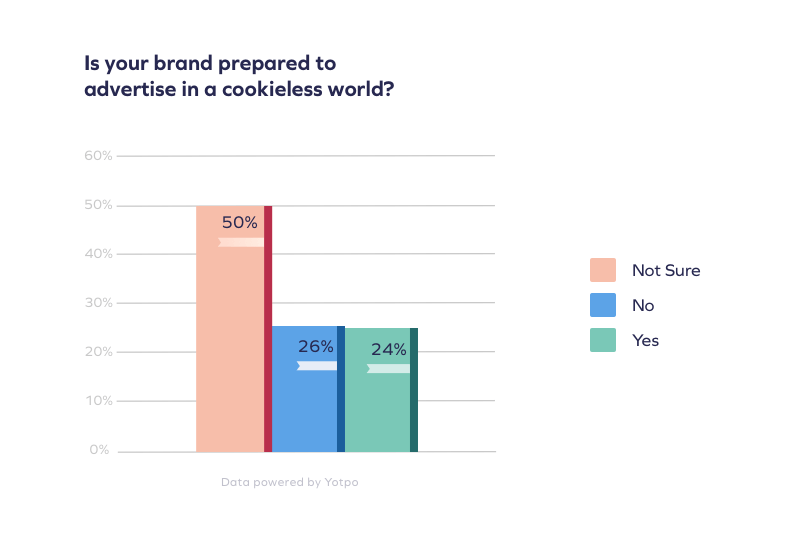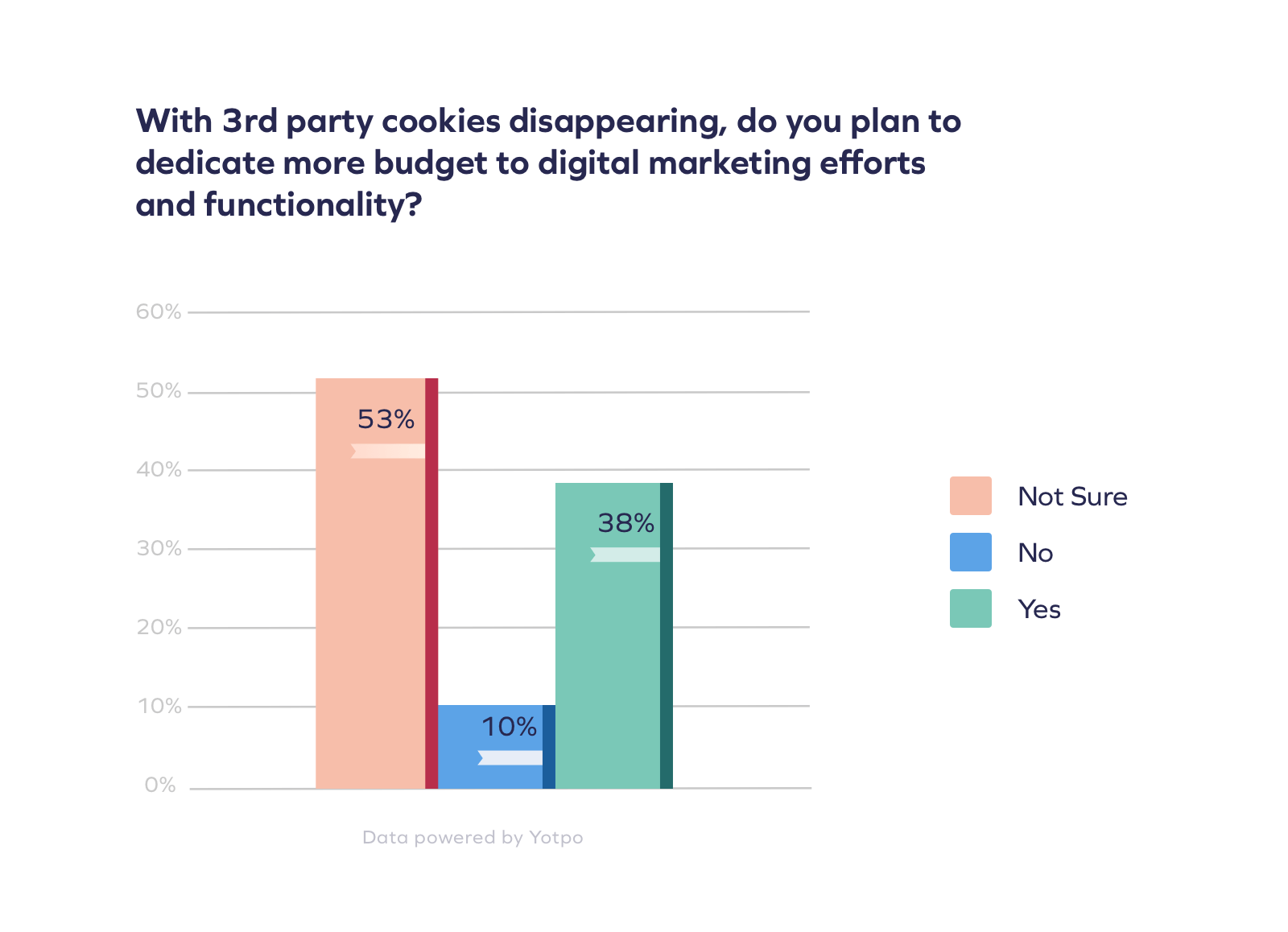By now, you’ve probably heard more than a few rumblings about the data privacy regulations set to take effect in the coming months.
Whether it’s the E.U., Google, Apple, or individual states, these new rules about cookies and third-party data will forever change how companies market to and learn about their customers. But what exactly does that mean for the future of eCommerce?
The truth is that not many people know.
At Yotpo, we recently conducted a survey of our community of D2C brands and asked them about their strategies. Specifically, we wanted to know if they felt prepared to advertise in a cookieless world and if they plan to dedicate more of their budget to digital marketing efforts once cookies are gone.

Overwhelmingly, the results showed that the majority of brands aren’t sure yet. (So don’t worry, you’re not alone.)
‘It’s Going to Make It Hard for Brands and Advertisers’
With so much uncertainty about the effect of the changes ahead, along with countless other priorities to focus on, it’s only natural that brands are just beginning to contemplate how to adapt.
Of both the small and mid-market brands that Yotpo surveyed, we found there was little consensus on the different ways to adjust.

“With all the data and privacy issues, and the difference in tracking, it’s going to make it hard for brands and advertisers to be able to really understand how platforms are impacting them,” explained Karalyn Zamora, the co-founder of Recoop and one of Yotpo’s Amazing Women in eCommerce honorees, earlier this year.
However, with more shoppers embracing eCommerce and more competition coming online by the day, brands simply can’t afford to lose their hard-fought momentum.
Why a New Strategy Can’t Wait
While the future is difficult to predict, we do know that customer acquisition costs will almost certainly rise after cookies go away and, worse yet, there’s no guarantee that increasing ad spends will yield positive results. (Sorry about that.)
“As data becomes limited, ad personalization and performance are anticipated to decline, and the full visibility into ad performance will be limited,” Adena Merabi, who heads up Strategic Partnerships at MuteSix, predicted earlier this year. This means that if ad efficiency drops by 20%, then brands that don’t change their approach could spend 20% more just to hit their previous targets.
The hard truth is that, as a result, brands will need to rely less on casting a wide net in order to reach potential customers and make conversions. This may strike some as an enormous challenge, but really, it’s an opportunity.
Reframing the Cookie Conundrum
Rather than get lost in the fine print of the policies, we’d prefer to reframe these new regulations as a chance to change the relationship that brands have with their customers — a change that would be for the better anyway.
An overwhelming majority of customers already bristle at the current model for data collection in the business world. According to a recent Pew study, 79% of Americans expressed concern about how companies use their data. (By the way, that’s 15 points higher than their concern about how the government uses personal data!)
Unfortunately, there’s no silver bullet solution to the problem, and it isn’t easily solved by reallocating ad budgets. The answer lies in something a bit more complex: creating value for your customers.
Forget the Cookie-Cutter Solutions
To overcome the challenges of these new limitations, brands should come to view data as a value exchange. In other words, brands will succeed if they create valuable experiences that make customers want to opt in, engage, and see the benefits of sharing first-party data instead of relying on cookies.
“There’s never been a better opportunity for brands to prioritize offering value to customers in exchange for becoming better known by the very brands they love,” says Michelle Horowitz, a Senior Vice President and the Head of Marketing and Communications for Blink Fitness and a Yotpo Advisory Board member.
“Rather than trying to spend more on ads to acquire fewer customers,” Horowitz continues, “brands that invest in authentic ways for customers to engage with them will see dividends in loyalty, community and, ultimately, word of mouth — which in turn will generate higher value customers over time.”
With privacy concerns and rules that can change at any given time, the tide in favor of this kind of data model is beginning to turn. According to our survey, 44% of brands already believe that first-party data received directly from customers is more valuable than data from cookies.
“In some ways, the answer is what we’ve always known: Brands need to create value for customers that gives them a reason to organically choose you, and agree to share their data and participate in your community,” Rosa Hu, Yotpo’s Vice President of Product Marketing, explains. “But how do you do that? It’s not an easy answer, but privacy-compliant engagement tools like SMS, loyalty programs that build lasting relationships, and user-generated content that creates trust all offer a clear and sustainable roadmap for brands in the post-cookie world.”
For a lot of reasons, bringing brands closer to customers is a better, more future proof approach to doing business. So when it comes to the eCommerce world changing course on data, we’re all for it. Here at Yotpo, we’ll be tackling some of the specific tactics that brands can take to adjust to the new realities about privacy in future posts. But for now, we’re excited to tell you: It’s time to get ready.
Want to be updated about all our future articles on privacy and more? Subscribe to our newsletter.














 Join a free demo, personalized to fit your needs
Join a free demo, personalized to fit your needs